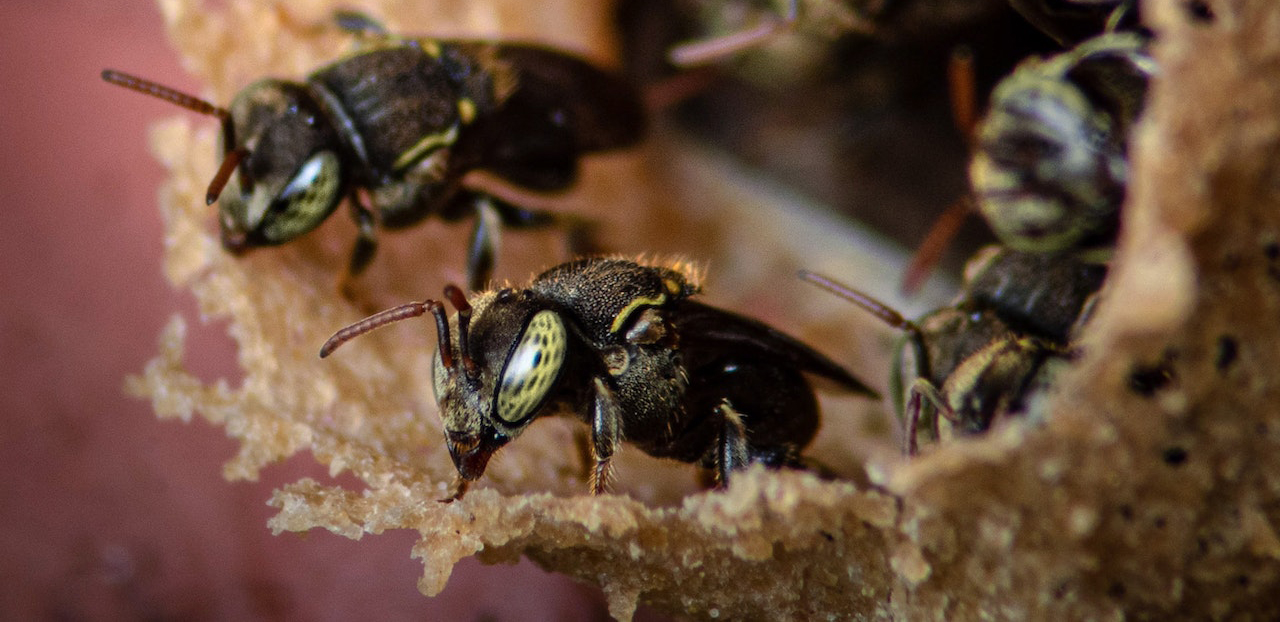Vulture bees, stingless bee species, offer unique ecological functions that contribute to the health and balance of their habitats, making them an integral part of the natural cycle. Unique recyclers, these bees help keep decaying organic debris, such as animal corpses, from piling up and speed up the decomposition process. They are highly effective in decomposing complex organic molecules, and as a result, they help recycle nutrients and improve soil quality.
Intricate honeycombs made of a special blend of wax and resin are the work of the vulture bee, another expert honey producer. The indigenous peoples of Central and South America have long appreciated this wonderful honey for its superior flavor and therapeutic benefits.
Deforestation, global warming, and pesticide use are just a few of the threats that vulture bees confront in the wild. However, scientists and environmentalists all around the world are making concerted efforts to ensure their survival by creating protected areas, advocating for sustainable beekeeping techniques, and educating the public.
Vulture bees engage in a broad variety of remarkable activities that aid in their survival and the health of the environment as a whole. Experts in thermoregulation, cooperative nest construction, and pollination are among these. These types of bees have a distinct taste for necrophilia, and they use strategies like communal nest construction and thermoregulation to ensure the best possible environment for their developing brood.
Unless provoked if their nest is damaged, vulture bees are calm and peaceful creatures. Although they may be housed in apiaries and bee farms, it is crucial to protect their natural habitat and encourage sustainable beekeeping methods. In addition to pollinating flowers, scavenger bees like vultures play an essential role in maintaining ecological stability by recycling dead organisms and nutrients. Vulture bees are at risk of extinction, but there are ongoing attempts to preserve their natural environments and assure their continued existence. Honey produced by vulture bees is not only edible but much sought after for its singular flavor and purported health benefits. It is considered a delicacy in some parts of Central and South America thanks to its distinctive flavor profile.
Mexico, Brazil, Colombia, Peru, and Ecuador are all home to vulture bees because of the biodiversity of their environments and the abundance of blooming plants found there. Vulture bees have important roles in the environment as recyclers, honey makers, and pollinators, and they can only thrive in the warmer temperatures and higher humidity found in the tropics and subtropics. Vulture bee honey has a unique flavor that appeals to many people. It may be used in a variety of ways in the kitchen, such as a drizzle over sweets, in drinks, and in hot dishes. Their honey has a complex flavor that combines earthy sweetness with a dash of floral brightness. Vulture bee honey has a richer and more nuanced flavor than honey from other bee species, and it’s delicious.
Vulture bees, sometimes known as stingless bees, have mouthparts adapted for sucking nectar and pollen, therefore they do not threaten people. When confronted or if their nest is disrupted, they may defend themselves by releasing a toxic venomous sting. Vulture bee stings are not as dangerous to humans as those of honey bees or other stinging insects. Avoid accidentally disturbing vulture bees by keeping your distance while you admire them from afar.
Vulture bees are endangered because they exclusively live in tropical rainforests. Their environment has some challenges which are impacting the bee’s ability to grow the next generation. The key factors impacting them are deforestation, habitat loss, and climate change which endanger these bees. Because of their diet of dead animals, these bees are unable to locate food due to deforestation. Climate change also threatens these types of bees as rainforests dry, and vulture bees have a tougher time finding food. Hurricanes and droughts, caused by climate change, can damage vulture bee nests. The IUCN classifies all three vulture bee species as “Vulnerable”. They are endangered and may perish soon if we don’t preserve them.

